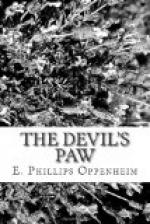“I realise the position perfectly,” Mr. Stenson observed drily. “I do not exactly know what to say to you personally, Orden,” he added. “Perhaps it is as well for us that the Council should have chosen an ambassador with whom discussion, at any rate, is possible. Nevertheless, I feel bound to remind you that you have taken upon your shoulders, considering your birth and education, one of the most perilous loads which any man could carry.”
“I have weighed the consequences,” Julian replied, with a sudden and curious sadness in his tone. “I know how the name of `pacifist’ stinks in the nostrils. I know how far we are committed as a nation to a peace won by force of arms. I know how our British blood boils at the thought of leaving a foreign country with as many military advantages as Germany has acquired. But I feel, too, that there is the other side. I have brought you evidence that it is not the German nation against whom we fight, man against man, human being against human being. It is my belief that autocracy and the dynasty of the Hohenzollerns will crumble into ruin as a result of today’s negotiations, just as surely as though we sacrificed God knows how many more lives to achieve a greater measure of military triumph.”
The Prime Minister rang the bell.
“You are an honest man, Julian Orden,” he said, “and a decent emissary. You will reply that we take the twenty-four hours for reflection. That means that we shall meet at nine o’clock to-morrow evening.”
He held out his hand in farewell, an action which somehow sent Julian away a happier man.
CHAPTER XVII
Julian, on, the morning following his visit to the Prime Minister, was afflicted with a curious and persistent unrest. He travelled down to the Temple land found Miles Furley in a room hung with tobacco smoke and redolent of a late night.
“Miles,” Julian declared, as the two men shook hands, “I can’t rest.”
“I am in the same fix,” Furley admitted. “I sat here till four o’clock. Phineas Cross came around, and half-a-dozen of the others. I felt I must talk to them, I must keep on hammering it out. We’re right, Julian. We must be right!”
“It’s a ghastly responsibility. I wonder what history will have to say.”
“That’s the worst of it,” Furley groaned. “They’ll have a bird’s-eye view of the whole affair, those people who write our requiem or our eulogy. You noticed the Press this morning? They’re all hinting at some great move in the West. It’s about in the clubs. Why, I even heard last night that we were in Ostend. It’s all a rig, of course. Stenson wants to gain time.”
“Who opened these negotiations with Freistner?” Julian asked.
“Fenn. He met him at the Geneva Conference, the year before the war. I met him, too, but I didn’t see so much of him. He’s a fine fellow, Julian—as unlike the typical German as any man you ever met.”




